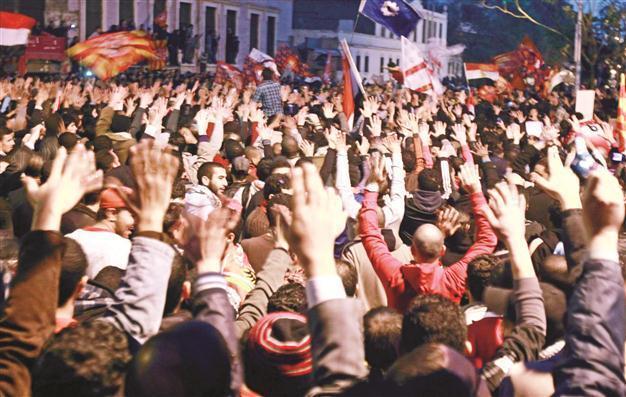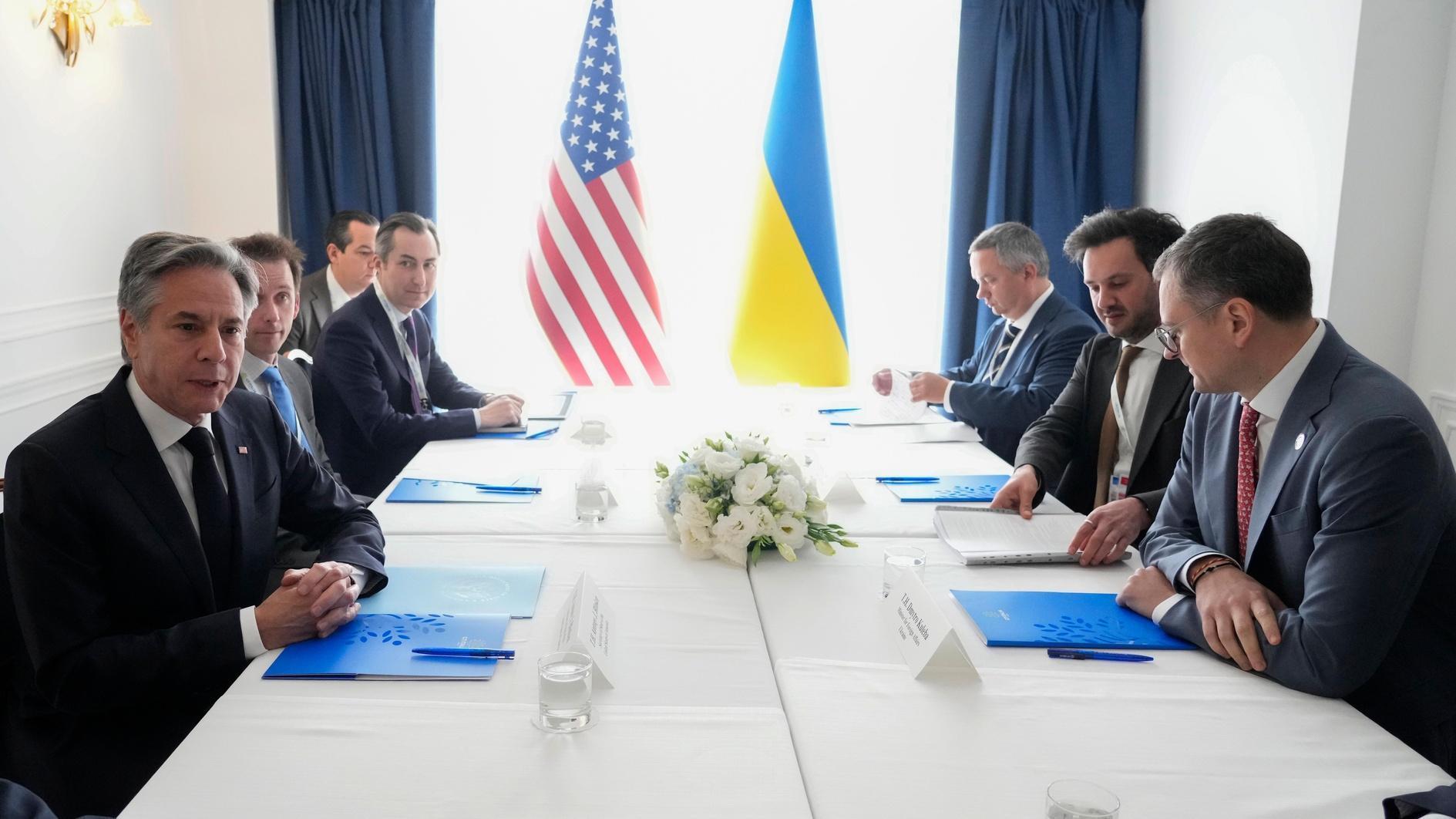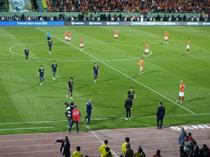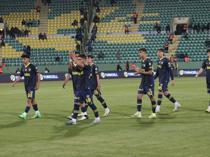Egypt ultras learning to play power game by political rules
James M. Dorsey

Police stand guard as fans chant slogans against the Interior Ministry during a protest condemning the deaths that followed a game between Al-Masry and Al-Ahly. The Port Said events were the deadliest incident since the overthrow of Hosni Mubarak. REUTERS photo
There are no immediate winners in Egypt’s latest crisis that erupted after the killing last week of 74 militant football fans at the end of a league match in Port Said.The militants are losing ground in their struggle to force the country’s military rulers to return to their barracks as the security forces have gained the upper hand in days of vicious street battles in downtown Cairo near the Interior Ministry building amid a desire from a majority of Egyptians for the clashes to end.
But in a concession to the protesters, the ruling Supreme Council of the Armed Forces (SCAF) has moved the presidential elections originally scheduled for June to forward to an as yet undetermined date. The deadline for nominations is now March 10, a month earlier than planned.
The earlier elections mean that a new constitution is likely to be drafted only after a president has been elected and could complicate the military’s efforts to ensure that it safeguards the armed forces’ privileges and perks.
Perhaps most importantly, Egypt as a nation, rather than any one party, will prove to be the ultimate beneficiary of the culmination of a year of football-related violence in Egypt. The increasing isolation of the militants or ultras – fanatical, well-organized, highly politicized, street-battle-hardened football fans – constitutes a defeat for their contentious street politics at the hands of electoral politics and the backroom political horse-trading that comes with it.
Credibility for toughness
The ultras earned their credibility and reputation for toughness in years of confrontations with security forces in Egyptian stadiums, their role in the battles at Tahrir Square during last year’s protests that toppled President Hosni Mubarak, the storming of the offices of the State Security Service last spring, the ransacking of the Israeli embassy in September in Cairo and vicious street battles with the military in November and December of last year. Scores were killed in those clashes and thousands more wounded.
Support for the ultras spiked in recent days in the wake of the Port Said incident in which 74 ultras were killed after a match won 3-1 by Al-Masry against Al-Ahly in what increasingly appears to have been a deliberate attack designed to punish them for their role in opposing Mubarak’s autocracy and post-Mubarak military rulers. Thousands initially joined the ultras in the days after the Port Said incident in their effort to storm the Interior Ministry.
However, that spurt of support quickly faded in a protest-weary country that retains confidence in the military despite its brutality and political ineptness, is frustrated with the lack of immediate economic benefit from last year’s toppling of Mubarak and yearns for a return to normalcy so that Egypt can return to economic growth.
The leaders of the ultras, revered and celebrated for their fearlessness and record of resistance, have learned their lesson. Applying that lesson is proving more difficult in groups founded by professionals and students whose ranks have swelled in recent years with disaffected, less educated, often unemployed youth whose raison d’etre is less a vision for Egypt’s future and more a sense of hatred of the security forces.
The leaders recognize that if the deaths in Port Said were intended to further isolate the militant football fan groups, the plot has backfired on the military with circumstantial evidence suggesting that the incident was provoked. On one hand, the military is cracking down on demonstrators and, on the other hand, it is unsuccessfully seeking to project itself as the protector of football supporters and the independent investigator into what sparked the incident.
Confidence not reduced
The ultras, however, also recognize that even if the public holds the military responsible for the lack of security in Port Said, this does not translate into reduced confidence in the armed forces.
The evidence that includes Twitter warnings in advance of the match in Port Said; the presence in the stadium of a group of unknown, alleged Al-Masry supporters armed with batons and knives; the locking of stadium entrances that usually were open so that people could not escape; and the fact that football violence is usually initiated by supporters of the losing rather than the winning team may not be firm enough to stand up in court. But it does put the military on the defensive and strengthens those seeking to assert civilian control over the armed forces.
A statement by the Muslim Brotherhood, who won the first post-Mubarak parliamentary election, suggested the group was aligning itself with the Egyptian public’s verdict and leveraging the incident in its effort to reduce the role of the military in the transition to democracy.
The Port Said incident gave the ultras a temporarily new lease on life. Police and ultras are settling in for the long haul. Clashes are likely to continue as Egypt gears up for presidential elections.
Increasingly, however, the ultras will only be able to regain public support by bridging their street tactics with an engagement in traditional politics and the give-and-take that it involves.
PAST LESSONS WELL LEARNED
At the core of the ultras’ defiance is the lessons learned after the failures of Arab revolutionaries in the 1970s and 1980s as expressed by prominent Syrian poet Adonis and Marxist ideologue Yasin Al-Hafiz.
The pair called for the people to leave no stone in society unturned in the hopes of changing the political structures but were stymied by autocratic leaders cloaked in the mantle of Arab nationalism.
The ultras look to avoid the mistake of their predecessors by allowing elements of the ancien regime and vested interests to shape Egypt’s future.
Since their inception in 2007, the ultras’ struggle has been as much about “karama” or dignity as it is has been about freedom. The ultras’ dignity is vested in their ability to stand up to the “dakhliya,” the Interior Ministry; the knowledge that in post-Mubarak Egypt they can no longer be abused by police. Security forces and ultras are both fighting for their place in the society. The police’s tarnished image was reinforced by Port Said, which was not a surprise given they were often absent from the streets and stadiums over the last year. They were hoping that incidents would prove that they were needed to prevent the country from descending into chaos.
















